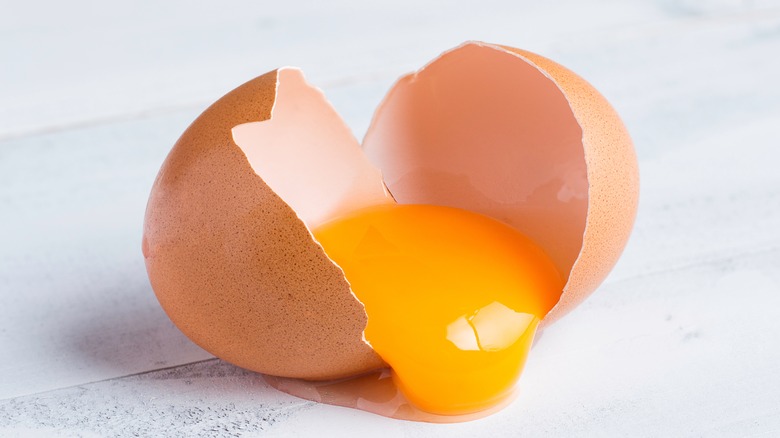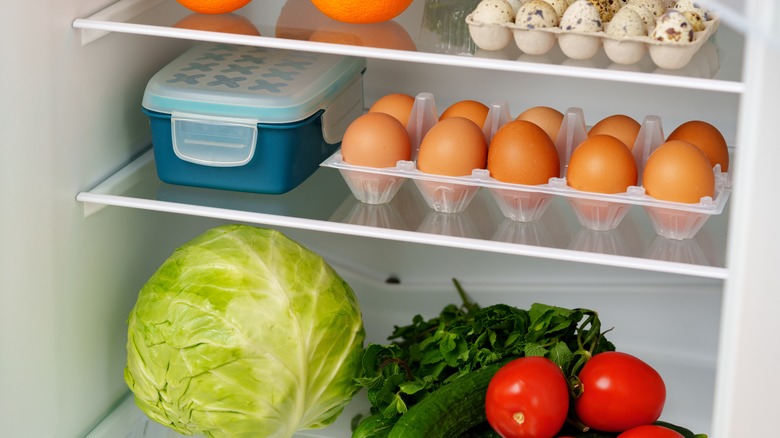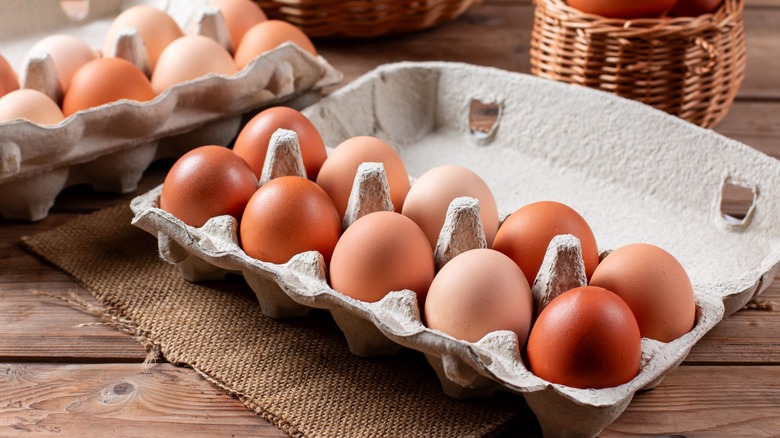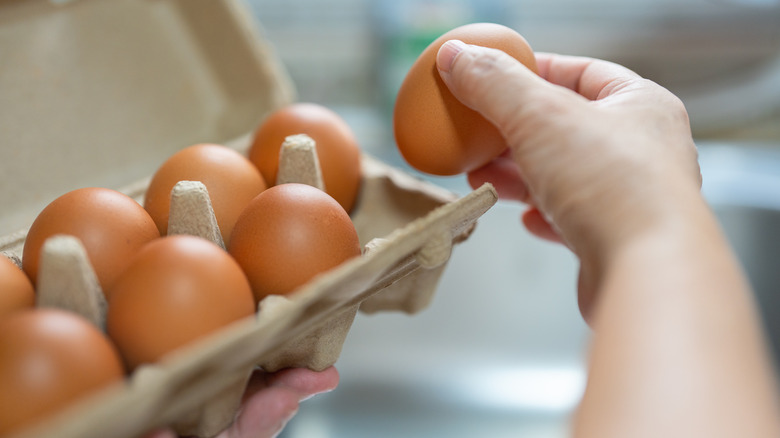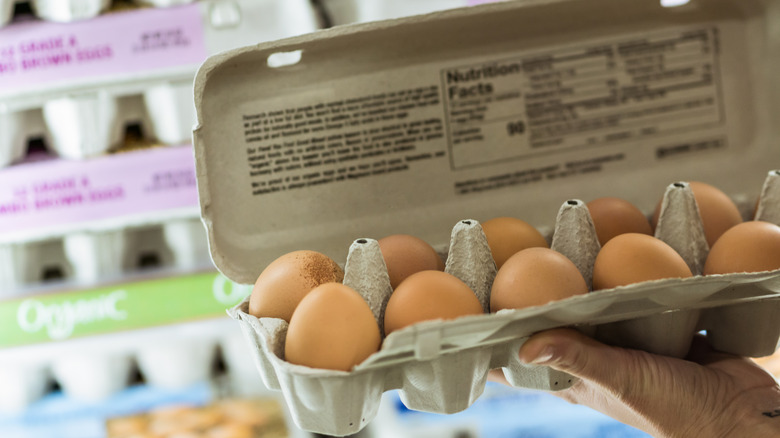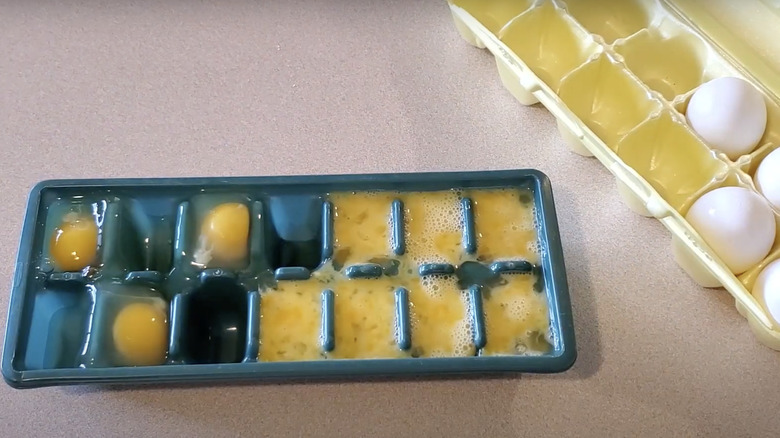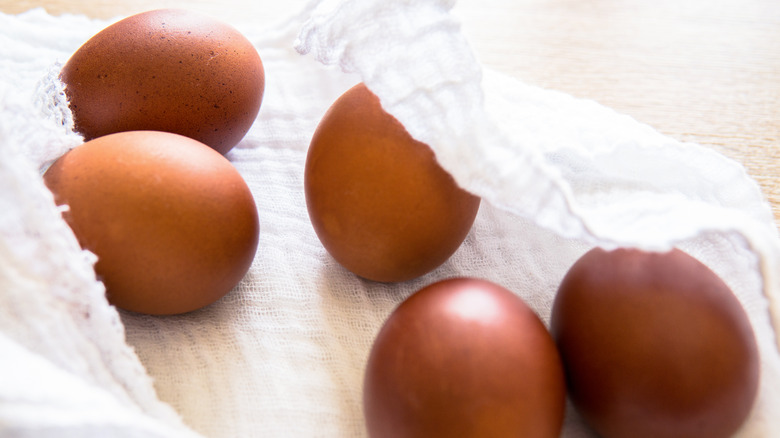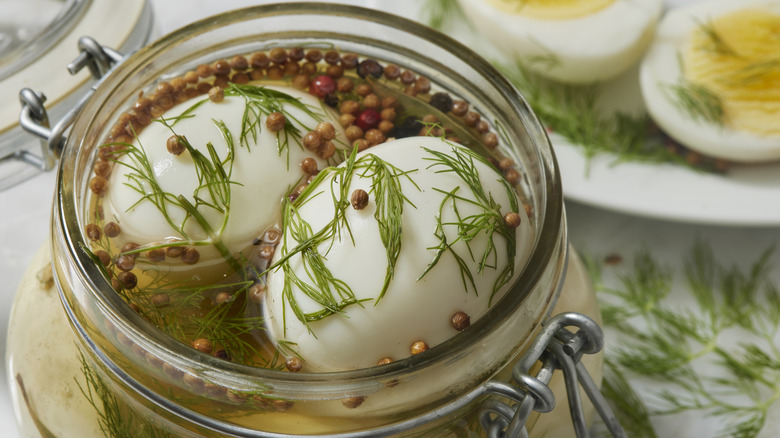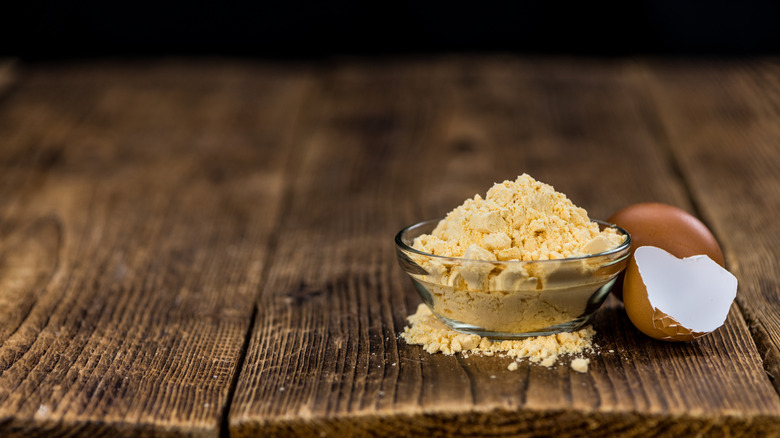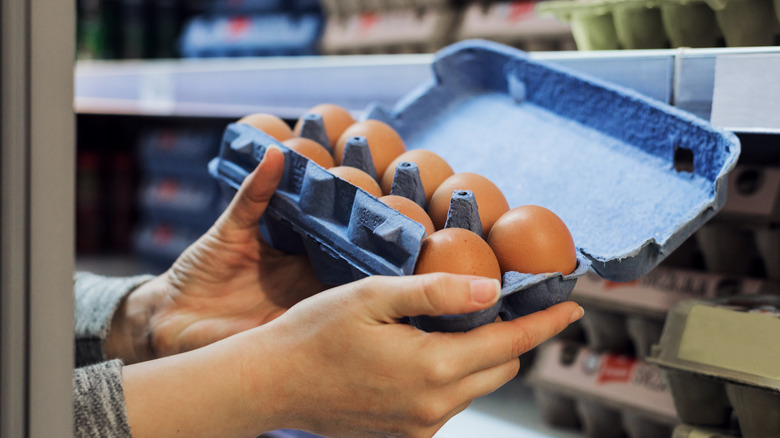11 Hacks To Make Your Eggs Last Longer
There are many good reasons why eggs are a staple around the world. They're ultra-versatile, offering countless culinary possibilities, from simple scrambled eggs and omelets to delicious breakfast frittatas and quiches. They're also indispensable in baking, providing structure to beloved treats such as cakes and cookies. Additionally, eggs are an affordable source of essential nutrients and vitamins, including choline, iron, folate, phosphorus, and vitamins A, B2, B5, B12, D, and E.
Whether scrambled, poached, fried, boiled, or baked, eggs make a great snack or addition to a more elaborate meal. This is why it's always a good idea to have a few — or a few dozen — on hand in your kitchen. However, since eggs are perishable, it's also crucial to know how to store them so they last as long as possible. This is particularly important since spoiled eggs can pose a risk of food poisoning. With this in mind, we've consulted some of the leading experts on the subject to bring you a list of tips that will not only preserve the shelf life of your eggs, but also ensure that they remain safe to eat.
Refrigerate eggs at the right temperature
There's an explanation for why eggs are stored in the refrigerated section of the supermarket in the United States, while in many other countries, they can be found on the shelves. It all boils down to food safety practices, especially when it comes to the prevention of salmonella. Under U.S. regulations, commercially produced eggs must be sanitized to rid them of any bacteria, dirt, or feces. Ironically, this process also removes the egg's cuticle, or protective coating, which helps keep bacteria at bay. This means that once washed, the eggs need to be refrigerated.
However, refrigerating eggs alone often isn't enough to keep them fresh — they need to be refrigerated at the right temperature. Sarah Beth Tanner, the "Eggspert" and "Eggfluencer" at Pete & Gerry's, recommends keeping an eye on your refrigerator's thermometer. "Refrigerating eggs at 40 degrees Fahrenheit or colder prevents bacterial growth on the freshly cleaned shells, so be sure your fridge is in the perfect window between 35 and 40 degrees Fahrenheit," she says.
If you happen to get your hands on some farm-fresh eggs that haven't been refrigerated or washed, you can store them either in the pantry or the refrigerator. Just remember that they won't last as long in your pantry, as highlighted by Kathy Berget from Beyond the Chicken Coop. "If you prefer not to refrigerate your farm-fresh eggs, store [them] in a cool, dry location and use [them] within one to two weeks," she advises.
Store eggs in their original carton
Don't be fooled by the little egg holders on the side of your refrigerator's door. They may not keep your eggs as fresh as storing them in other parts of the fridge and, in fact, may not even keep them at a safe temperature at all. This is because the temperature inside the refrigerator door fluctuates each time it's opened.
To prevent this, Sarah Beth Tanner recommends storing eggs in their original carton. "We meticulously design them as the perfect storage devices! Why spend the time and energy to transfer them to a less-than-ideal container?" she says. "[The cartons are] stackable, lightweight, and won't shatter, keeping your eggs safe from the hustle and bustle of a busy fridge." According to Becky Hardin, the founder and recipe developer at The Cookie Rookie, keeping eggs in their original carton will also help prevent moisture loss and odors from penetrating the eggs.
However, it's not just the egg storage container that matters. The location within the refrigerator where you place your eggs also plays a crucial role in how long they remain fresh. The best place to store your eggs is on the middle shelf of the refrigerator. "I also recommend avoiding the very top shelf of your fridge or any corners where cold air might not circulate as well — eggs can freeze and break at the tippy top of the refrigerator!" Tanner says.
Don't wash your eggs
Many people feel the need to wash store-bought eggs due to concerns about cleanliness and food safety. In reality, washing eggs can do more harm than good — and this goes for both freshly laid eggs and the eggs you buy at the store. When eggs are laid, they are naturally coated with a protective layer called the cuticle. Cleaning the eggs removes this layer, leaving them more exposed to bacterial contamination.
According to Sarah Beth Tanner, once the eggs are out of the coop, it's best to gently clean them off with a brush or fine-grade sandpaper, rather than washing them under running water. She also says that even though farm-fresh eggs can be kept at room temperature, refrigerating them will prolong their shelf life. "Even though unwashed eggs with the cuticle ... can safely be stored at room temperature, refrigerating farm-fresh eggs will help them last longer — often about five to six weeks," Tanner says.
Since eggs purchased at the store in the U.S. have already been sanitized, there's little point in cleaning them at home. Actually, washing eggs before storing them in the fridge or before cooking can be counterproductive. Amy Leigh Mercree, holistic health expert and author, explained this in an interview with Reader's Digest, saying, "If you wash an egg before you cook it, because its shell is porous, the water ... can push bacteria into the egg."
Store eggs upside down
Whether you opt to keep your eggs inside their original packaging, in the cups on the side of the refrigerator door, or in another container altogether, it's best to store them pointy side down, as explained by Kathy Berget. "The rounded side has an air sac. Keeping the air sac on the top of the egg helps maintain freshness," she says.
If the egg is stored blunt side down, as it ages, the air bubble will try to make its way to the top of the egg, pushing the egg yolk up. The sac will also expand in size as the eggshell lets in more air and the egg loses moisture. In the worst-case scenario, the air pocket could even rupture, allowing bacteria to reach the yolk, where they can multiply and spoil the egg. As a side note, since egg whites are alkaline, they're not as susceptible to bacterial growth as the yolks.
Storing eggs with the pointy end facing down will ensure that the air pocket stays in the egg's rounded side, keeping the yolk in place and reducing the chances of contamination. Lastly, those partial to deviled eggs are likely to appreciate the beautifully centered yolks of eggs stored upside down.
Understand egg labels and move older eggs to the front of the refrigerator
Most commercially produced eggs come with a packing date, which marks the time when they were graded, sanitized, and placed in the carton. This date comes in the form of a three-digit code that denotes the day of the year, starting with 001, or January 1, and ending with 365, or December 31. Egg cartons also typically display a sell-by or EXP (expiration) date. That said, eggs are usually still safe to eat after this date passes and can generally be refrigerated and consumed between three and five weeks after purchase. According to Becky Hardin, all of the refrigerator storage tips for store-purchased eggs can also be applied to farm-fresh eggs, which means that they should be consumed within five weeks of being laid.
While most people don't store more than a dozen eggs in their refrigerator at a time, those who like to buy eggs in bulk or keep a large stock should keep a watchful eye on the expiration dates on the cartons. To ensure that none of the eggs go to waste, it's a good idea to move the older cartons to the front of the refrigerator. This way, you will use the older eggs first and prevent any from spoiling.
Freeze your eggs
If you find yourself with too many eggs on your hands, there's no need to despair. When done the right way, freezing eggs can dramatically extend their shelf life. The first rule to remember is that freezing eggs in their shells doesn't work. This is because freezing causes the yolks and whites to expand, which is likely to crack the eggshells and make the eggs unusable. Luckily, you can easily freeze just the egg whites, just the egg yolks, or the whites and yolks scrambled together.
Becky Hardin recommends cracking whole eggs into standard ice cube trays before freezing. "Sprinkle [them] with a little salt and cover them with plastic wrap. Once they are frozen, pop them out, add them to an airtight bag, and label it with the date." While Hardin says that the same process should be repeated for egg yolks, salt isn't necessary when freezing egg whites alone. This is because the salt is only added to the yolks to prevent them from turning gelatinous in the freezer — a problem that doesn't affect egg whites.
Kathy Berget also recommends portioning out the amount of egg yolks and whites before freezing them. "I often need four egg whites for a recipe, so I'll freeze that amount in a container. Mixing the egg lightly with a fork creates a better frozen egg. However, try not to incorporate too much air into the egg," she says.
Ensure that frozen eggs are thawed properly
Eggs can be stored in the freezer for up to 12 months; however, their quality will deteriorate over time. As such, it's recommended to consume them within four months. Like many other ingredients, frozen eggs need to be thawed before use. And, just like regular eggs, they need to be fully cooked before consumption. To avoid confusion, Kathy Berget reminds us to clearly label containers with the freezing date and the number of whole eggs, yolks, or whites.
So, what's the best way to defrost your eggs? Becky Hardin advises moving them from the freezer to the refrigerator a day before cooking. This will keep them safe from any bacterial contamination. Alternatively, Hardin says that in culinary emergencies, you can also pop the container with the frozen eggs under running water. To keep the eggs from becoming waterlogged, place them in a waterproof plastic bag. Once thawed, be sure to use the eggs immediately.
Storing eggs in salt is also used as a method of egg preservation, as highlighted by Becky Hardin. "Another method is to pack eggs in salt, which absorbs moisture and inhibits bacterial growth, extending their shelf life," she says. Nevertheless, Hardin is also quick to point out that preserving eggs in salt is likely to dry them out over the course of a few months, which might not be optimal for some culinary purposes.
Coat the eggs
As we've established, freshly laid eggs are covered in a protective membrane that helps to safeguard them from bacterial contamination. In the U.S., this film is removed when the eggs are processed before they hit the supermarket shelves. Luckily, you can easily recreate this coating in your kitchen to extend the shelf life of commercially produced eggs. Becky Hardin recommends coating store-bought eggs with vegetable oil. "Vegetable oil contains antibacterial compounds that cover the eggshell pores, reducing evaporation and preventing bacteria from entering the egg," she says.
However, it's not just vegetable oil that can be used to create a protective barrier around eggshells. The internet is full of different coating ideas to preserve the shelf life of eggs. For instance, some home chefs preserve their eggs by coating them in shortening or lard. The fat is usually melted over gentle heat and poured into a bowl before the eggs are rolled around in the mixture. Once the fat solidifies, it can be rubbed into the eggs to achieve the best possible coating. According to netizens, the same process can also be performed with beeswax and FDA-approved household paraffin wax.
Pickle your eggs
Pickling not only infuses eggs with flavor, but it can also prolong their shelf life. In fact, pickled eggs are said to have been brought to the U.S. on the Mayflower in 1620, a journey that took some 66 days. While it's best to eat pickled eggs within a month, they can be stored in the refrigerator for up to three months.
So, how do you go about pickling eggs? The first step is to hard-boil the eggs and peel them — you can do this ahead of time and store the eggs in the fridge to make things easier. Next, make your brine with ingredients like vinegar, salt, and water and bring the concoction to a boil. Finally, place your eggs in jars, top them with the brine, and add your favorite aromatics for flavor. These can include chili peppers, garlic, mustard seeds, fresh dill, turmeric, and even sliced jalapeños. Pickled eggs are commonly eaten as a snack, on salads, or in sandwiches.
Dehydrate your eggs
One of the main reasons why eggs spoil is moisture. Dehydration preserves eggs by removing their moisture content, thus inhibiting the growth of bacteria. Incredibly, dried eggs can be stored for up to five years in the freezer or up to two years in a cool and dry environment. Once opened, however, they should be consumed within two weeks. Dehydrated eggs can be easily reconstituted by mixing them with water.
While eggs can be dehydrated in the oven, most experts recommend using a food dehydrator. To dehydrate eggs, first scramble or hard-boil them. Once the eggs cool, place them on a dehydrator tray. If you're dehydrating hard-boiled eggs, peel and slice them. Dehydrate the eggs at 135 degrees Fahrenheit for five to six hours, at which point they should look dry and brittle. Once done, let them cool and pulverize them in a food processor before placing them in an airtight container or a vacuum-sealed bag.
Inspect your eggs for freshness and quality
If you're uncertain about the freshness of an egg, it's best to play it safe. After all, eating a spoiled egg can leave you with a bad case of food poisoning. This is why it's important to test that your eggs are still good before consumption, including those that haven't reached their expiry date. According to Becky Hardin, the first step in this process is visually inspecting the eggshell for cracks, sliminess, or powdery residue, as these can be indicative of bacterial growth or mold. "Crack the egg onto a plate; a fresh egg has a neutral smell, a firm yolk, and thick white. If the egg has a sulfuric or foul odor, or a flat yolk and a watery egg white, it is spoiled and should be discarded," she adds.
Many experts swear by the "egg float test." Kathy Berget is one such advocate. Highlighting the simplicity of the process, she explained its steps: "Place an egg in a large bowl filled with water. If the egg sinks and lays flat, the egg is fresh. If the egg stands upright, it's still safe to eat, but it's not as fresh. If the egg floats, the egg is not fresh and should be discarded."
